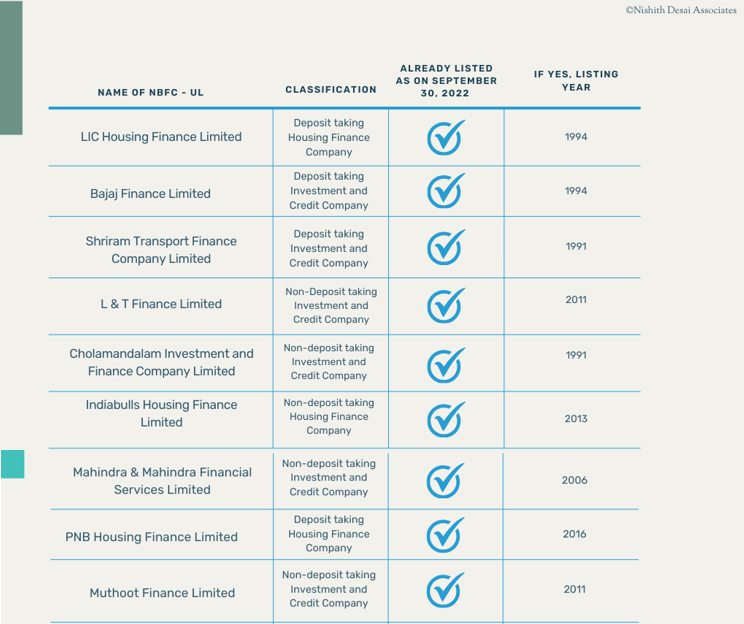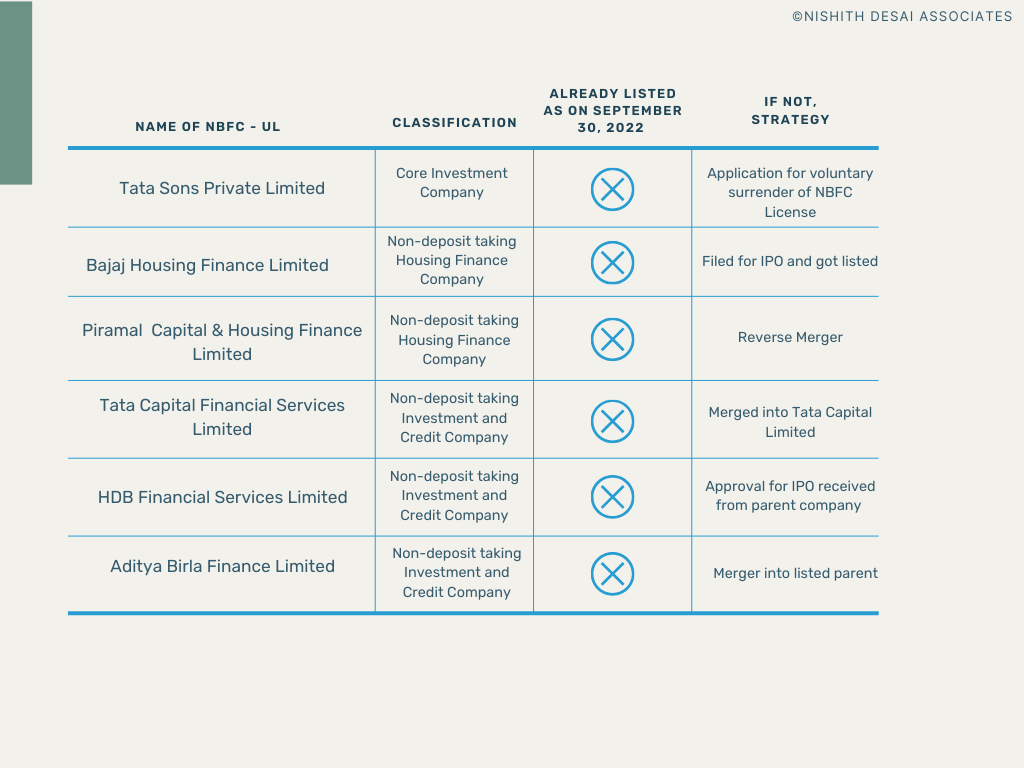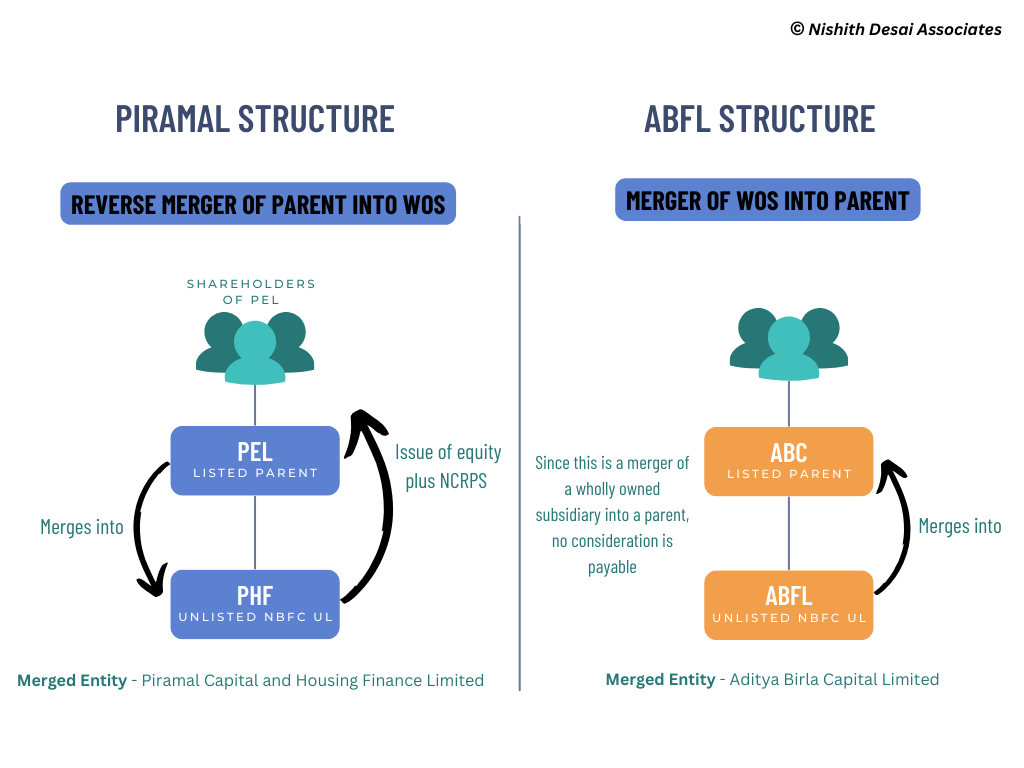Deal Talk
October 18, 2024
High Stakes, Smart Moves: Upper Layer NBFC's and
the Mandatory Listing Requirement
A. Introduction
On October 19, 2023, the Reserve Bank of India
(“RBI”) released the
Master Direction – Reserve Bank of India (Non-Banking
Financial Company–Scale Based Regulation)
Directions, 2023 (“Scale Based Regulations”).
This pivotal framework categorizes non-banking financial
companies (“NBFCs”)
into four distinct “layers” based on
their size, activities, and perceived risks: base,
middle, upper, and top. This approach is based on
a layer-wise increase in regulatory scrutiny. So,
for example, a middle layer NBFC is subjected to
greater scrutiny than a base layer NBFC.
The Scale Based Regulations mandate the RBI to
specifically identify upper layer NBFCs (“NBFC-ULs”)
based on certain qualitative and quantitative parameters
and supervisory judgment as per their position as
on March 31 of the immediately preceding financial
year.1 In September 2022, the RBI had
released a list of 16 NBFCs that were categorised
as NBFC-ULs for the year 2022-23 (“September
2022 Notification”), which was further
revised to 15 for the year 2023-24.2
One of the noteworthy conditions of the Scale
Based Regulations requires an NBFC-UL to mandatorily
list its shares on the Indian stock exchanges (“IPO”)
within three years of being classified
as an NBFC-UL (“Mandatory
Listing Requirement”). Since the
NBFC-ULs were first so categorised in the September
2022 Notification, they are required to comply with
the aforesaid requirement within three years of
such date (i.e. before September 30, 2025).
In our latest edition of Deal Talk, we explore
the diverse structures that these NBFC-ULs have
adopted to comply with the Mandatory Listing Requirement.
The current NBFC–ULs can be divided into
two buckets: (i) NBFC-ULs which were already listed
prior to release of September 2022 Notification
and were therefore not impacted by Mandatory Listing
Requirement (“Bucket 1”);
and (ii) NBFC-ULs which were unlisted and had to
get listed as per the Mandatory Listing Requirement
(“Bucket 2”).
Let’s look at a brief snapshot of each
NBFC-ULs within Bucket 1 and 2:
Bucket
1:

Bucket
2:

B.
“Structuring” the Mandatory
Listing Requirement
The NBFC-ULs in Bucket 2 have adopted different
strategies to comply with the Mandatory Listing
Requirement. These strategies can be broadly classified
into three routes:
The NBFC-UL achieving
listing on Indian stock exchanges pursuant to
an IPO (“Route 1”);
or The NBFC-UL merging
with an existing listed company within its group
(“Route 2”);
or The NBFC-UL voluntarily
surrendering its NBFC license to the RBI (“Route
3”).
Route
1
One of the most recent examples of NBFC-ULs that
have achieved listing on the Indian stock exchanges
is Bajaj Housing Finance Limited (“Bajaj
Housing Finance”). HDB Financial
Services Limited (“HDB”)
has also recently announced that it is in the process
of preparing draft offer documents for submission
to SEBI for an IPO pursuant to receipt of approval
from the board of its parent company (i.e. HDFC
Bank).3
So far as Tata Capital Financial Services Limited
(“TCFSL”) is concerned,
it undertook a restructuring wherein TCFSL along
with Tata Cleantech Capital Limited merged into
Tata Capital Limited (“TCL”).4
Further, the board of TCL has approved another restructuring
wherein Tata Motors Finance Ltd (“TMFL”)
will merge into TCL. As a consideration of the merger
of TMFL into TCL, TCL will issue equity shares to
the shareholders of TMFL. It has been publicly reported
that TCL may likely request for an extension of
the September 2025 deadline for complying with the
Mandatory Listing Requirement owing to the merger
of TMFL into TCL.5 However, it remains
to be seen whether it pursues Route 1 post completion
of its merger.
Route
2
To fulfil the Mandatory Listing Requirement,
NBFC-ULs such as Piramal Capital and Housing Finance
Limited (“PHF”) and
Aditya Birla Finance Limited (“ABFL”)
have opted for the merger route by merging with
an existing listed company within their group structure.
Let’s take PHF’s example: PHF is
a wholly owned subsidiary of Piramal Enterprises
Limited (“PEL”), a
listed company that is registered with the RBI as
a non-deposit taking NBFC-ICC. The proposed merger
arrangement envisages the reverse merger of PEL
into PHF, with the surviving entity (PHF) being
subsequently listed on stock exchanges.
ABFL is opting for a similar structure to comply
with the Mandatory Listing Requirement. ABFL intends
to merge into its parent company Aditya Birla Capital,
which is currently registered with the RBI as an
NBFC-CIC and is listed.

Route
3
Tata Sons (the parent company of the Tata Group)
is currently categorized as an NBFC-CIC and is therefore
governed by the Core Investment Companies (Reserve
Bank) Directions, 2016 (“CIC Directions”).
As per Paragraph 6 of the CIC Directions, NBFC-CICs
that fall within either of these categories are
not required to be registered with
the RBI as a CIC and can operate as an “unregistered
CIC”: (a) CICs with an asset size of less
than INR 100 crores (irrespective of whether they
access public funds), or (b) CICs an asset size
of INR 100 crore and above (that do not access public
funds).
Earlier this year, Tata Sons applied to the RBI
for a voluntary surrender of its NBFC-CIC license
and requested for permission to continue as an “unregistered
CIC”.6 To operate as an unregistered
CIC, Tata Sons would effectively have to repay its
debt. In its application, Tata Sons has stated that
it has already repaid a significant amount of its
borrowings. Further, with respect to the residual
borrowings and to provide additional comfort to
the RBI at the time of evaluation of its surrender
application, Tata Sons has provided an undertaking
indicating its ability to repay it.
As per the CIC Directions, if an entity is an “unregistered
CIC”, the CIC Directions are inapplicable
to it.7 Accordingly, if Tata Sons is
classified as an “unregistered CIC”,
it will not need to comply with the Mandatory Listing
Requirement since it will no longer be considered
as an “NBFC-UL” for the purposes of
the September 2022 Notification.
Although its application
is currently pending, it will be interesting to
see what RBI decides given that Tata Sons is one
of the largest NBFC-ULs in India. Interestingly, a right to information request was filed with the RBI seeking clarity as to whether Tata Sons has sought an exemption from the Mandatory Listing Requirement. The response from RBI revealed that no such exemption has been sought.8
C. Concluding
Remarks
The September 2022 Notification was introduced
to mitigate the systemic risk associated with the
potential collapse of large-sized NBFCs that have
raised substantial public funds. As the September
2025 deadline approaches, most NBFC-ULs are working
towards meeting the Mandatory Listing Requirement
through Routes 1, 2, or 3. It would be interesting
to see how the remaining NBFC-ULs will implement
their strategies to comply with the Mandatory Listing
Requirement. These structures will also form the
bedrock for compliance strategies for NBFCs which
are declared as NBFC-ULs in the future.
Authors:
Parina Muchhala,
Anurag Shah and
Nishchal Joshipura
You can
direct your queries or comments to the relevant member.
1Annex 1, Scale Based Regulations.
2https://www.rbi.org.in/scripts/FS_PressRelease.aspx?prid=54474&fn=14.
3https://www.thehindubusinessline.com/markets/upper-layer-nbfc-hdb-financial-services-prepares-for-ipo/article68693781.ece.
4https://www.tatacapital.com/content/dam/tata-capital/pdf/investors-and-financial-reports/scheme-of-arrangement/Revised-Scheme-of-Arrangement.pdf.
5https://www.moneycontrol.com/news/business/banks/tata-capital-may-ask-rbi-for-more-time-to-list-12786905.html.
6https://www.tata.com/content/dam/tata/pdf/fy24/Tata-Sons-Annual-Report-FY24.pdf (page 9).
7Paragraph 2(2), CIC Directions.
8https://www.moneylife.in/article/rbi-says-tata-sons-has-not-sought-exemption-from-listing-requirements-ipo-before-september-2025-deadline/75404.html.
Disclaimer
The contents of this hotline should
not be construed as legal opinion. View detailed disclaimer.
This hotline does not constitute a
legal opinion and may contain information generated
using various artificial intelligence (AI) tools or
assistants, including but not limited to our in-house
tool,
NaiDA. We strive to ensure the highest quality and
accuracy of our content and services. Nishith Desai
Associates is committed to the responsible use of AI
tools, maintaining client confidentiality, and adhering
to strict data protection policies to safeguard your
information.
This hotline provides general information
existing at the time of preparation. The Hotline is
intended as a news update and Nishith Desai Associates
neither assumes nor accepts any responsibility for any
loss arising to any person acting or refraining from
acting as a result of any material contained in this
Hotline. It is recommended that professional advice
be taken based on the specific facts and circumstances.
This hotline does not substitute the need to refer to
the original pronouncements.
This is not a spam email. You have
received this email because you have either requested
for it or someone must have suggested your name. Since
India has no anti-spamming law, we refer to the US directive,
which states that a email cannot be considered spam
if it contains the sender's contact information, which
this email does. In case this email doesn't concern
you, please
unsubscribe from mailing list.
 |
|
We aspire
to build the next generation
of socially-conscious lawyers
who strive to make the world
a better place.
At NDA, there
is always room for the right
people! A platform for self-driven
intrapreneurs solving complex
problems through research, academics,
thought leadership and innovation,
we are a community of non-hierarchical,
non-siloed professionals doing
extraordinary work for the world’s
best clients.
We welcome
the industry’s best talent -
inspired, competent, proactive
and research minded- with credentials
in Corporate Law (in particular
M&A/PE Fund Formation),
International Tax , TMT and
cross-border dispute resolution.
Write to
happiness@nishithdesai.com
To learn more
about us
Click here.
|
|
Chambers
and Partners Asia
Pacific 2024:
Top Tier for Tax,
TMT, Employment,
Life Sciences, Dispute
Resolution, FinTech
Legal
Legal 500
Asia Pacific 2024:
Top Tier for Tax,
TMT, Labour &
Employment, Life
Sciences & Healthcare,
Dispute Resolution
Benchmark
Litigation Asia
Pacific 2024:
Top Tier for Tax,
Labour & Employment,
International Arbitration
AsiaLaw
Asia-Pacific 2024:
Top Tier for Tax,
TMT, Investment
Funds, Private Equity,
Labour and Employment,
Dispute Resolution,
Regulatory, Pharma
IFLR1000
2024: Top
Tier for M&A
and Private Equity
FT Innovative
Lawyers Asia Pacific
2019 Awards:
NDA ranked 2nd in
the Most Innovative
Law Firm category
(Asia-Pacific Headquartered)
RSG-Financial
Times:
India’s Most
Innovative Law Firm
2019, 2017, 2016,
2015, 2014
|
|
|
|

